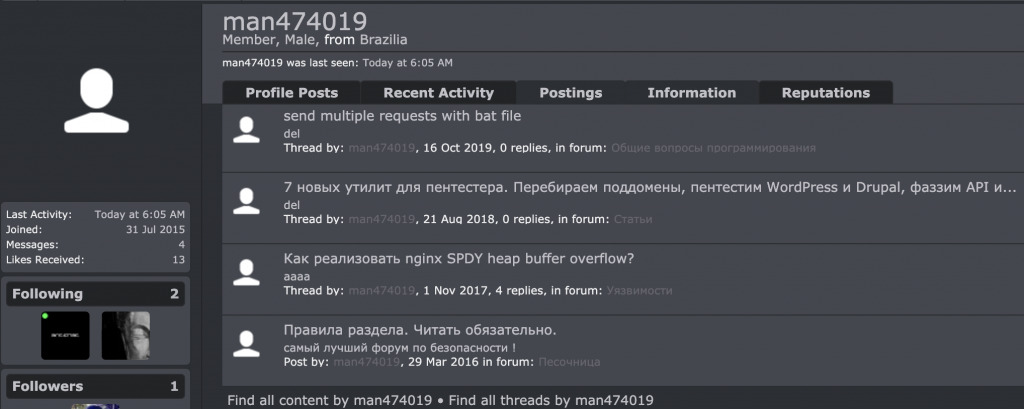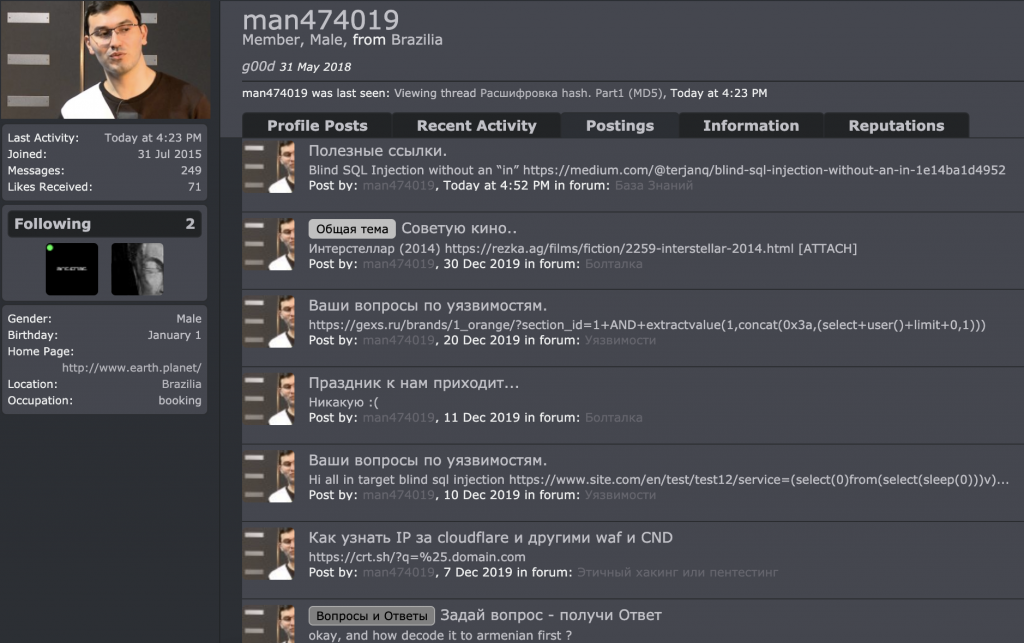On January 6, veteran human rights lawyer Intigam Aliyev received an email from another human rights lawyer Rasul Jafarov. Aliyev, spotted something was not right and forwarded the email he received to Javarov’s real email. This is not the first time, Jafarov is targeted. In 2017, the case was captured in detail by Amnesty International. Unlike Jafarov’s first experience, this time, the email was sent only to a handful of people (at least from what Jafarov was able to collect).
Based on the contents of the phishing email, together with Qurium , it was possible to identify the following information:
- malware inside the WeTransfer link is written in python and compiled for windows;
- the malware has been built using a software called technowlogger (more here);
- The malware records keystrokes, passwords and sends them to a Gmail account after deactivating the antivirus program on your device;
- In their forensic investigation, Qurium team was able to identify the email address: man474019 [ @ ] gmail.com. This user, has expressed interest in pen-testing tools, penetration testing and other forms of attacks in hacking forums. Including one attack against criminal.az (website currently blocked and it’s editor facing criminal prosecution).

According to this TEDx bio, Alibay Mammadov is based in Japan. He is the head of the Azerbaijan Japan Collaboration Association founded in Tokyo in 2016. The association aims to promote bilateral business relations between Japan and Azerbaijan. He is also the President of Azepro Co., Ltd. Azerbaijan Internet Watch has reached out to Mammadov, warning him of the situation however received no response in return.
The attacker seems to continue his research, as his most recent appearance in the forum was on January 14, 2020:

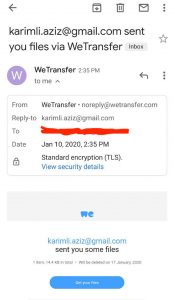
This, however, was not the last phishing attack.
On January 10, an independent online news platform HamamTimes was targeted with a similar phishing attack. The email came through a Gmail account that belongs to journalist Aziz Karimov.
A similar phishing attack was carried out against Azadliq Radio, Azerbaijan Service for Radio Free Europe Radio Liberty team.
On January 11, a larger group of civil society representatives received another WeTransfer link from Roberto Fasino. Fasino is the Head of the Secretariat, PACE Committee on Culture, Science, Education, and Media.
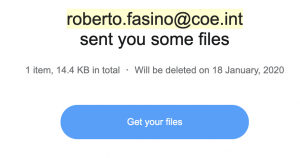
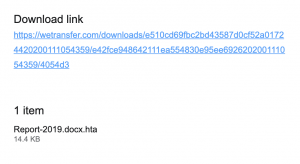
WeTransfer does not verify emails for validity when inserted in the sender or recipient box – you can insert anyone’s email. As a result, any email can be used, including that of Roberto Fasino in the sender box [see below].

According to Qurium forensics, the virus sent to HamamTimes and from Roberto Fasino is “powershell” exploit that can gain full access to a windows machine. It connects to an intermediary server where the attacker can connect to control the victim’s device. This is how the attack looks when broken down into steps:
- The attacker prepared the “powershell” attack;
- Obfuscate the code using HTML Guardian (HTA file);
- Upload the file to We-transfer and mail to several victims [how the contact list has been obtained is still unclear – one scenario is that the sender’s email, in this case, roberto.fasino@coe.int was compromised;
- Once the victim’s device is infected the attacker then continues to perform the attack performing “Reflective DLL” injection into the infected device and uploads the “merterpreter” code;
- The final step, allows the attacker to have full access to a victim’s device, running commands remotely;
The forensics report also identified that the attacker has set up an account in ngrok.com service to hide his computer.
Once the virus is inside the infected device, it connects to the ngrok.com address 3.17.202.129 and port number 16885.
So far, attempts to reach ngrok.com founder Alan Shreve for a comment and assistance yield no results:
@inconshreveable We have an attack against human right activists in Azerbaijan that involves https://t.co/Lj0UV6tP2d Can you help?
— Qurium Media (@Qur1um) January 13, 2020
On January 14, new evidence showed the attacker was also using Facebook messenger to infect devices. The new evidence, as well as further investigations of the IP address of the attacker, revealed man474019 to be connected to the government of Azerbaijan and that this was the same location from where DDoS attacks against several independent and opposition websites were coordinated in 2017. The new report also shows that this network includes several ministries, as well as the presence of several firewalls with digital certificates signed by the national cert (cert.az)
Orkhan Shabanov, whose name and email appear in Hacking Team leaks indicated in Qurium’s report, is an employee at the Ministry of the Interior. In his capacity, Shabanov was among participants at the Open-ended intergovernmental expert group meeting to conduct a comprehensive study of the problem of cybercrime that took place in Vienna in March 2019.
What is phishing:
It is when you receive an email from someone who pretends to be someone you know, and phishes for your private information by asking you to download the attachment, or click on a link that would take you to a different page where you are prompted to enter some of your personal sensitive information, including passwords.
In 2019, Amnesty Tech released a detailed report on common phishing attacks used against journalists and rights defenders in MENA. Many of these conclusions apply to other countries as well.
The report describes the following most common types of phishing attempts:
- “Reset your password” email – attacker impersonating Google alerts the owner of the account of an alleged unsuccessful login attempt. It then offers to secure the account. Once clicked on the provided link, it redirects you to a page that may look like your Gmail login page, but in fact, it is a fake;
- “OAuth Phishing” – is a Web standard used to allow authentication over third-party services without the need of sharing passwords. It is used by companies like Google, Facebook, and Microsoft. According to Amnesty report, this type of phishing allows “attackers use the same architecture but in order to create malicious third-party applications and attempt to lure the targets into granting the applications access to their accounts (such as emails)”;
- Google phishing abusing legitimate third-party applications – using the method, attackers abuse the authentication procedure employed by legitimate and verified third-party applications;
This post is based on the research of Azerbaijan Internet Watch and Qurium Media Foundation. A full forensic report by Quriu is available here.
Since the release of this and Qurium’s forensic report, man474019 seem to have removed some of the information from https://forum.antichat.ru/
You can see the difference from how the user profile looks now and from Wayback machine capture (July 2019). The picture is gone too.
